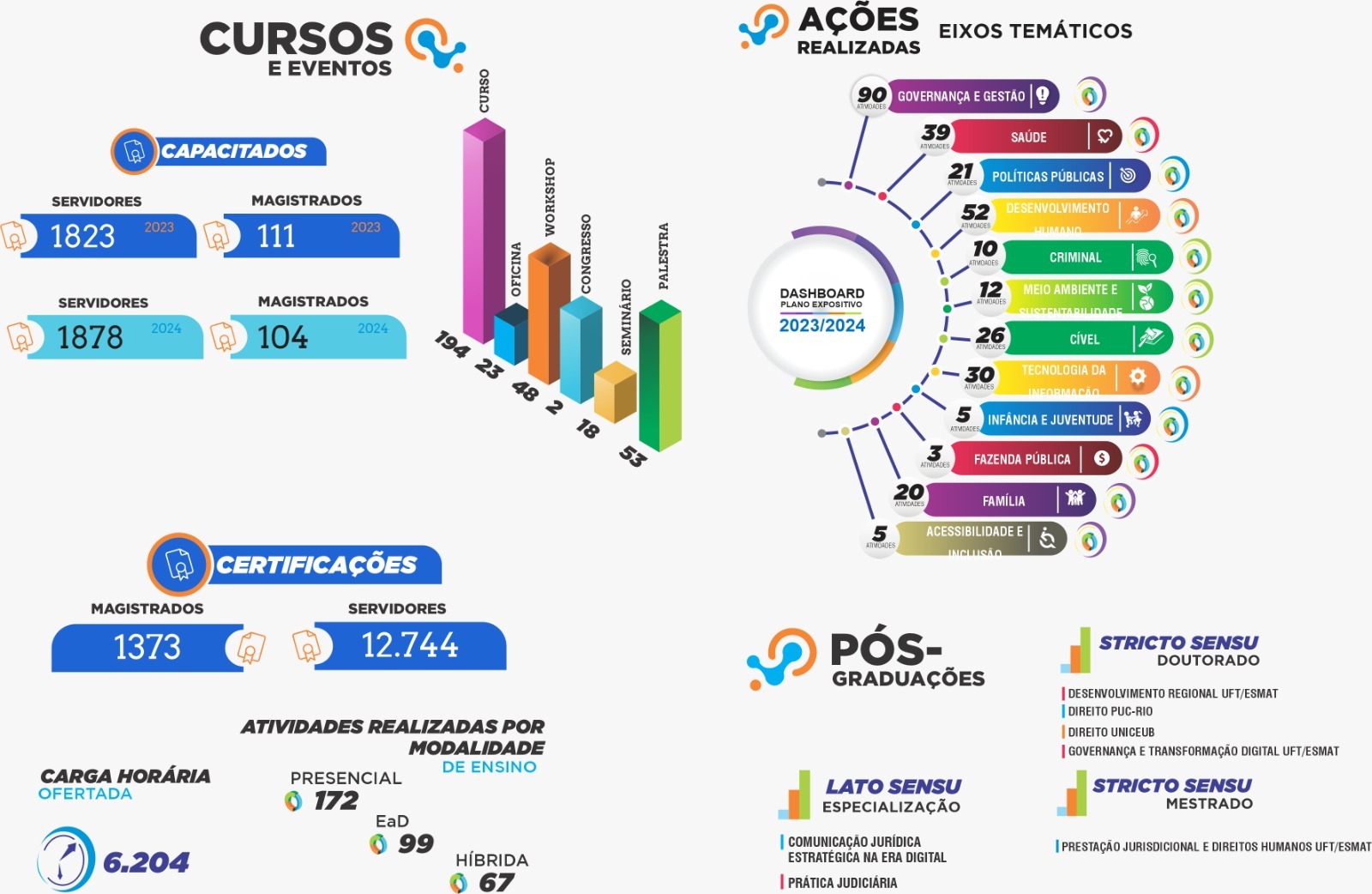
A national benchmark in the qualification and improvement of the justice system, the Superior School of the Judges of the State of Tocantins (Esmat) is seeking to consolidate the progress it has made and expand its activities into new areas. For the 2025-2027 biennium, the priorities are to expand the use of Generative Artificial Intelligence (GAI), strengthen applied scientific research and promote internationalization.
According to Justice Marco Villas Boas, general director of Esmat, the aim is to develop new courses and projects that explore the various possibilities of GAI in the legal sphere, such as data analysis, predicting court decisions and creating virtual assistants. The proposal is to “increase the efficiency and transparency of justice, contributing to procedural speed and reducing litigation.”
In order to strengthen expanded scientific research, the general director says that the goal is to encourage scientific production and the dissemination of innovative research in the area of Legal Sciences and Information Technology, with a focus on relevant themes that promote the development of the Judiciary of the state of Tocantins.
“To position Esmat as a national and international reference in legal research, contributing to the development of specialized knowledge for the solution of social problems,” said the justice.
And to promote the internationalization of the School, the director says that the aim is to establish new partnerships with foreign teaching and research institutions to exchange knowledge and experiences. In this sense, Esmat also intends to offer courses in partnership with foreign universities, take part in international events and develop research projects in collaboration with international institutions with a view to strengthen the image of Esmat on the world stage.
Strategy of success
With more than 14,000 certificates issued in the last two years, Esmat celebrates the results achieved, which, according to the director, demonstrate the success of the continuing education strategy.
The partnership with UFT and PUC Rio resulted in the certification of 19 magistrates and two civil servers with doctoral degrees, as well as 32 others who are in the doctoral stage, strengthening applied research in the Judiciary of the state of Tocantins.
“The implementation of innovative courses, such as Generative Artificial Intelligence, and the holding of high-profile scientific events demonstrate our commitment to excellence in teaching. The impact of this work is already visible: we see an increase in academic production, more efficiency in resolving cases and a strengthening of the culture of innovation in the Judiciary," he emphasizes.
Transforming impact
Justice Ângela Haonat, deputy director of Esmat, also highlights the results achieved by the School, and consequently by the Judiciary of the state of Tocantins, during the two-year period. According to the director, they demonstrate the transforming impact of the School on professional qualification and academic innovation.
Among the main points, she mentions the expansion and efficiency of the training of magistrates and civil servers. During the two-year period, certifications for civil servers rose from 6,228 to 6,516, while certifications for judges increased from 533 to 840.
“The figures reflect significant progress and indicate a strengthening of the mission of Esmat to continuously qualify the professionals of the Judiciary of the state of Tocantins, which contributes to a more efficient and humanized judicial service,” she says.
Another point mentioned by the director concerns academic innovation and the consolidation of strategic partnerships. “During the two-year period, Esmat stood out for its ability to innovate and establish strategic collaborations,” she emphasized.
In this sense, the justice mentions the development of STRICTO SENSU postgraduate programs, including the first doctorate in Regional Development, with 11 new graduates; the offer of Professional Master's classes in Judicial Provision and Human Rights for states such as Acre and Roraima, representing a milestone in the expansion of the impact of Esmat beyond the state of Tocantins; the signing of agreements, such as the one with the University of the state of São Paulo (USP), which has brought a significant academic differential, enabling the exchange of knowledge, joint projects and access to training programs in emerging areas, such as smart cities and digital transformation; as well as the approval by the Coordination for the Improvement of Superior Education Personnel (Capes) of the Professional Doctorate in Judicial Provision and Human Rights (PPGPJDH), a partnership between UFT and Esmat.
Social impact and institutional sustainability is another point mentioned by the director, who recalls the social impact initiatives in which Esmat has been highlighted: participation in projects aimed at indigenous and quilombola communities, with educational and socio-political inclusion actions, reinforcing the role of the School in promoting citizenship; and campaigns, such as the collection of books for prison units and indigenous villages, which demonstrate the commitment of the institution to contribute to social transformation through education.
Excellence
During this period, the director highlights the recognition of excellence, with the maintenance of the ISO 9001:2015 certification, which ensures quality standards in management and reflects the commitment of the School to a constantly improvement of its processes.
"During the two-year period, Esmat demonstrated its vision of the future by incorporating discussions on technology and sustainability into the academic environment. The launch of new initiatives for the use of artificial intelligence reinforces the preparation of magistrates and civil servers to deal with the challenges of digital transformation," emphasizes Justice Ângela Haonat, stressing that the expressive numbers, together with the innovative initiatives and the social impact demonstrate that the School not only fulfills its institutional mission, but also positions itself as a transforming agent in the Judiciary of the state of Tocantins.
“"The focus on human qualification and academic and technological development is in line with the values of the values and the demands of contemporary society. This not only strengthens the Judiciary, but also contributes to a more efficient Justice system, accessible and connected to the needs of citizens," he concludes.
Esmat
An organ of the Judiciary of the state of Tocantins, Esmat was created by the Resolution 005 of 1998 and installed in 2003, with the aim of training and perfecting judges and civil servers as essential elements in improving the provision of justice.
The school is located in the city of Palmas, but it covers the entire State. Courses and actions are offered in various thematic areas, such as governance and management, public policies, information technology, accessibility and inclusion, environment and sustainability, civil, criminal, human development, children and youth, among others.





